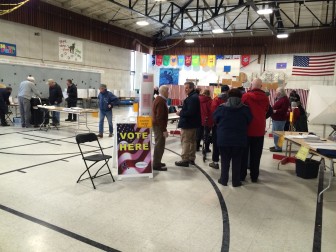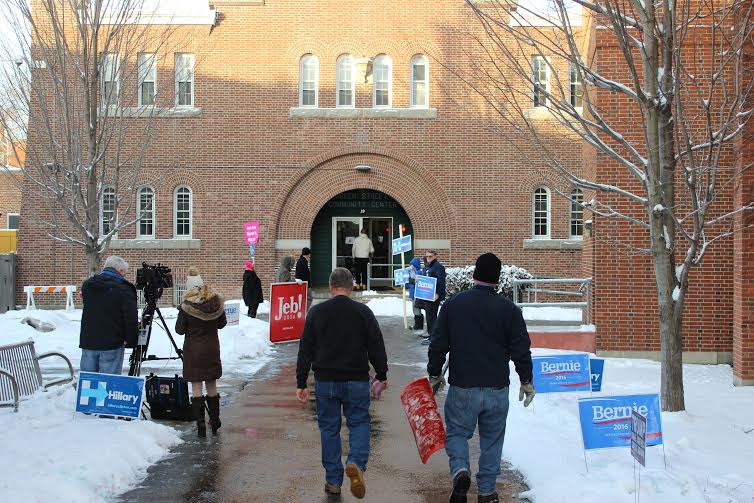
Voters gather at Little Harbour School in Portsmouth. Elaine Wood Photo
New Hampshire and Iowa set the stage for passionate voter participation during the nation’s first presidential primary and first presidential precinct caucuses.
Chalk it up to hotly contested nomination campaigns in both the Republican and Democratic parties.
The passion was abundant particularly among Trump and Sanders supporters who connected with calls by the Republican and Democratic primary winners in New Hampshire, respectively, for a new approach in Washington.
“We’ve tried it both ways; we tried it Republican and we tried it Democratic, and it’s simply not working,” said Jenny Van Oort, a senior at Buena Vista University in Storm Lake, Iowa, who caucused in that state for Sanders. “If something doesn’t change soon, I’ll never see an iota of the successes that my parents have laid out before me.”
Folks in Merrimack , N.H., were voting later than usual because of a traffic snafu Tuesday when CNN projected at 8 p.m. what ended up being runaway victories for Vermont Senator Bernie Sanders and billionaire Donald Trump in New Hampshire’s primary.
Sanders, who lost by a razor-thin margin in the Iowa Caucuses, trounced former Secretary of State Hillary Clinton 60 percent to 38 percent on the Democratic side.
Trump, who lost to Texas Senator Ted Cruz in Iowa, enjoyed a spectacular win in New Hampshire taking 35 percent of the vote, leaving Ohio Gov. John Kasich very pleased with a 16 percent second-place finish. Cruz ended the night with 12 percent, while Florida Gov. Jeb Bush and a chastised Florida Senator Marco Rubio tied at 11 percent.
Gov. Chris Christie took his family home to New Jersey to re-evaluate his candidacy after getting only 8 percent; former business executive Carly Fiorina took 4 percent and Dr. Ben Carson ended up with 2 percent with 89 percent of the New Hampshire vote counted Wednesday morning.
Ranee Washburn of Concord, N.H., said voters like Trump because he’s not a politician. “People are sick and tired of the government,” Washburn said.
Even so, she and her husband Bob, a certified public accountant and investment advisor, threw their support behind Fiorina, who came in second-to-last. “Bob and I have really enjoyed Carly Fiorina. We’ve seen her three times and love what she has to say.”
They also like Cruz, but if Trump is the last Republican standing on election day, he can count on both of their votes over either Clinton or Sanders.
“Bob said he’d hold his nose,” if the GOP candidate does in fact turn out to be Trump, but would vote for him anyway, Washburn said.
In true New Hampshire presidential primary tradition, Chris Cook of Barrington, N.H., met the candidate who would eventually earn his support more than once since last September. Cook, 53, a baker at the University of New Hampshire in Durham, liked what Christie had to say.
“I met him at the Seafood Festival last September and again in Portsmouth,” Cook said. “I told him to hang in for the long haul.” That looked increasingly unlikely late Tuesday.
Cook said it’s about the economy for him and pointed to the Radio Shack store that has shuttered its doors at the other end of the Lee, N.H., shopping center as he was leaving Market Basket with groceries Tuesday night.
These are among the takeaways voters in Iowa and New Hampshire left for the upcoming South Carolina Republican primary on Feb. 20, the same day Nevada Democrats caucus, but also the Feb. 23 Nevada Republican Party caucuses and South Carolina Democratic primary on Feb. 27 before Tuesday, March 1. That day features primaries or caucuses in 12 states, American Samoa and for Democrats abroad.
Clinton’s supporters knew the dismal poll numbers for their candidate before the New Hampshire primary, but perhaps didn’t believe they would hold true. They did.
Some were already putting her razor-thin win in Iowa into perhaps a hopeful perspective for their candidate as they looked ahead to the rest of the primary season.
“Iowa is not such a predictable barometer,” Kevin Owens, a Clinton supporter from Des Moines, said on caucus night. “It’s just a matter of time before people realize that Sanders has no foreign policy.”
Clinton won 49.8 percent of the support in Iowa’s Feb. 1 Democratic caucuses. Sanders won 49.6 percent.
In defeat, Clinton ended Tuesday night insisting she still loves New Hampshire while Sanders promised to keep his momentum going.
Denise Blaha, 53, who works at UNH’s Institute for the Study of Earth, Oceans and Space, said she voted for Sanders despite calls from Gloria Steinem and former Secretary of State Madeleine Albright to support a potential first female presidency.
“I feel he best exemplifies the quality of a president and what’s important to me,” Blaha said.
How does she respond to people who say Sanders can’t go all the way after New Hampshire? “He can’t go all the way if we don’t come out and support him,” Blaha said.
Blaha said she is deeply concerned about the leading Republican contenders. “I find it repugnant some of the statements that have been made by Republicans,” Blaha said.
James Kelliher, 18, of Dover, N.H., wants to go to college next year and epitomized what Sanders means to young voters here.
“Hillary lost, that’s what counts,” Kelliher said. He doesn’t trust that she would do what’s right for the country.
“And (Sanders) is going to give everybody the shot they need and the one’s they deserve. Hopefully I’ll get some grants for college,” he said.
Cruz found himself having to recharge his appeal to the anti-Washington sentiment that gave him a caucus win in Iowa. Yet voters in Iowa showed that Cruz’s hammering on themes such as throwing military might at defeating ISIS and cracking down on immigrants in the United States without legal documentation can provoke an emotional response, as well, in some Republican voters.
Other candidates, notably Trump, are hitting those themes, too. Even so, Randall Busche, a Cedar Falls, Iowa, insurance agent said of Cruz, “He’s the only one who’s stood on principles and not just talk the storm all the other candidates can talk.”
Cruz won 27.6 of the preference vote taken at Iowa Republican caucuses on Feb. 1. Trump was second with 24.3 percent and Rubio was close at third with 23.1 percent of the vote. Ben Carson finished fourth with 9.3 percent.
Kasich, who scored at second place in New Hampshire, won only 1.9 percent of Iowa’s Republican preference poll.
Republicans vote in a preference poll before selecting delegates to a county convention at the start of the caucus process in Iowa while Democrats form viable groups and select delegates committed to candidates.
One of the story lines emerging from Iowa and New Hampshire is whether or not Rubio can regain any momentum he took into New Hampshire from Iowa.
Rubio had success in Iowa in caucuses such as one in downtown Des Moines, populated by urban professionals. “Sen. Rubio really pulled it out here,” that precinct’s chairman, Tyler Campbell said.
But on Tuesday in New Hampshire, Rubio apologized to his supporters for his recent debate performance when Christie called him out on his robotic campaign rhetoric. He took responsibility for the damage done, although by tying Bush he can at least stay in the race.
“I did not do well on Saturday night so listen to this, it will never happen again,” Rubio promised.
Some voters wondered about the future for Carson and Fiorina.
“He’s given it 100 percent,” Sybil Schroeder, of Dubuque, Iowa, said about Carson. Politically active for many years, some of them as a poll watcher, Schroeder had high hopes for Carson on caucus night in Iowa on Feb. 1 in part because of Carson’s appeal to evangelical Christian conservatives. “He’s not just a surgeon operating on people. You have to have a higher power guiding your hand.”
Brittany Robb in Des Moines, Payton R. Van Vors in Dubuque, Mackenzie Rappe and Justice Gage in Storm Lake, and Leziga Barikor in Cedar Falls contributed reporting from Iowa.





